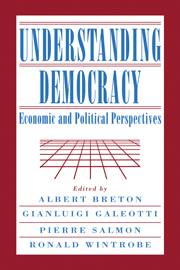Book contents
- Frontmatter
- Contents
- Contributors
- Introduction
- Part I Democracy, the market, and the law
- 1 Democratic stability as a self-enforcing equilibrium
- 2 Democracy, competition, and the principle of Isonomia: An economic analysis of the political exchange as an incomplete contract
- 3 Constitutional democracy: An interpretation
- 4 Necessary and sufficient conditions for a viable democracy
- Part II Democracy and economic growth
- Part III Democratic deficiencies and possible improvements
- Part IV Democratic expectations
- Index
4 - Necessary and sufficient conditions for a viable democracy
Published online by Cambridge University Press: 05 December 2011
- Frontmatter
- Contents
- Contributors
- Introduction
- Part I Democracy, the market, and the law
- 1 Democratic stability as a self-enforcing equilibrium
- 2 Democracy, competition, and the principle of Isonomia: An economic analysis of the political exchange as an incomplete contract
- 3 Constitutional democracy: An interpretation
- 4 Necessary and sufficient conditions for a viable democracy
- Part II Democracy and economic growth
- Part III Democratic deficiencies and possible improvements
- Part IV Democratic expectations
- Index
Summary
Introduction
Let me warn the reader at the very beginning that this is not a formal essay, though the title might suggest it. The verbal reasoning will, however, be as rigorous as possible.
The definition of “democracy” has been a matter of contention for decades. Some scholars have limited the characteristics used for the definition to electoral competition among politicians and parties for governmental powers. Others have included the rule of law and the separation of powers as well as other elements in the definition. Now, whereas everybody is free to select definitions at his discretion, one should keep in mind that definitions do not make much sense without being applied in the framework of a theory. Also, it should always be clear which definition is used.
In the present essay I want first to discuss some factors eroding the stability of democracy as it is defined in the second, broader sense mentioned above (Sections 2–4). This means also that some questions concerning the preconditions for the existence and development of such democracies have to be raised (Section 5). Specifically, the following hypotheses will be discussed:
Apart from a system of self-sufficient farmers, a free-market economy with private property rights is a necessary, but not sufficient condition for the existence of stable democracies.
Democracies with unlimited or nearly unlimited jurisdiction for simple majorities of the population (direct democracy) or representative parliaments tend to erode the safety of property rights and the rule of law and to steadily increase government activity.
[…]
- Type
- Chapter
- Information
- Understanding DemocracyEconomic and Political Perspectives, pp. 88 - 104Publisher: Cambridge University PressPrint publication year: 1997

